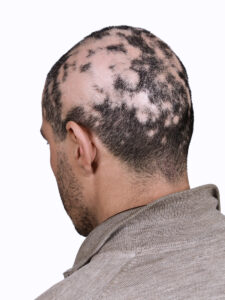
by Daniel J. Cameron, MD MPH
In a recent issue of the American Journal of Dermatopathology, Lynch and colleagues report on the case of a 21-year-old man who suffered hair loss following a tick bite to the scalp. [2] The man presented with nonscarring alopecia, a pattern of hair loss similar to alopecia-areata, also known as spot baldness.
Tick bite-induced nonscarring alopecia typically presents as patches, often described as “motheaten” or patients may have nodular, blood crusted lesions. According to the authors, symptoms include pain, pruritus or swelling. “There is usually a history of tick bite to affected areas, but lack of patient-reported tick attachment does not rule out this diagnosis.”
The patient’s nonscarring tick-borne alopecia was complicated by external trauma including hair pulling and lichen simplex chronicus, a condition of thick, leathery, brownish skin caused by chronic itching and scratching.
 The nonscarring tick-borne alopecia was thought to be due to a robust host response. “Tick bite alopecia is a reported phenomenon that is thought to be caused by a robust host response to tick-injected saliva containing an anticoagulant and anti-inflammatory and immunomodulatory chemicals,” explains Lynch.
The nonscarring tick-borne alopecia was thought to be due to a robust host response. “Tick bite alopecia is a reported phenomenon that is thought to be caused by a robust host response to tick-injected saliva containing an anticoagulant and anti-inflammatory and immunomodulatory chemicals,” explains Lynch.
There is good news for nonscarring tick-borne alopecia. “Because few hair follicles are truly destroyed in this form of tick bite alopecia, hair regrowth is commonly observed, usually within 3 months; [3-5] however, alopecia has been reported to persist for 5 years after healing of local reaction to tick bites,” according to a series of four papers cited by Lynch. [6]
A scarring form of tick bite alopecia has also been described in Europe. “Tick-borne lymphadenopathy syndrome, classically transmitted by ticks of the genus Dermacentor and caused by Rickettsia slovaca infection, is an emerging entity typically seen in Europe,” according to Lynch. “Doxycycline remains the treatment of choice.”
[bctt tweet=”Hair loss in Lyme disease – the last straw?” username=”DrDanielCameron”]
Generalized hair loss, as well, has been described in Lyme disease patients. [7] “Diffuse alopecia occurred within three months after the outbreak of disease in 3 out of 23 (13%) patients with Lyme meningitis and in 40 out of 71 (56.3%) patients with tick-borne encephalitis,” according to Cimperman from the University Medical Centre, Ljubljana, Slovenia. “The mean duration of alopecia was 2 to 3 months and alopecia was reversible in all patients.”
There are a number of causes of scarring and nonscarring alopecia including autoimmune conditions, such as lupus, diabetes and fibromyalgia. [8] Moreover, medications used to treat systemic autoimmune disease and fibromyalgia have also been associated with alopecia.
Hair loss can impair the quality of life of patients with systemic disease. “Patients in remission from their global systemic disease are often left with alopecia, which significantly impairs their self-esteem and interferes with their personal and professional lives,” according to Moghadam-Kia from the University of Pittsburgh Medical Center. “This situation is often not adequately recognized, and withdrawal from social and work functions often leads to or augments long-standing depression in the patient.”
“To the authors’ knowledge, this is the fifth report of nonscarring tick bite alopecia in the literature and the first in an adult patient,” writes Lynch. There are undoubtedly many more undocumented cases of Lyme disease patients suffering from not only generalized hair loss but from tick-borne alopecia. The authors are to be congratulated for bringing attention to an under-recognized medical condition which can greatly impact patients’ lives.
References:
1. Cameron DJ, Johnson LB, Maloney EL. Evidence assessments and guideline recommendations in Lyme disease: the clinical management of known tick bites, erythema migrans rashes and persistent disease. Expert Rev Anti Infect Ther, 1-33 (2014).
2. Lynch MC, Milchak MA, Parnes H, Ioffreda MD. Tick Bite Alopecia: A Report and Review. Am J Dermatopathol, 38(11), e150-e153 (2016).
3. Ross MS, Friede H. Alopecia due to tick bite. AMA Arch Derm, 71(4), 524-525 (1955).
4. Heyl T. Tick bite alopecia. Clin Exp Dermatol, 7(5), 537-542 (1982).
5. Krinsky WL. Dermatoses associated with the bites of mites and ticks (Arthropoda: Acari). Int J Dermatol, 22(2), 75-91 (1983).
6. Raoult D, Lakos A, Fenollar F, Beytout J, Brouqui P, Fournier PE. Spotless rickettsiosis caused by Rickettsia slovaca and associated with Dermacentor ticks. Clin Infect Dis, 34(10), 1331-1336 (2002).
7. Cimperman J, Maraspin V, Lotric-Furlan S, Ruzic-Sabljic E, Avsic-Zupanc T, Strle F. Diffuse reversible alopecia in patients with Lyme meningitis and tick-borne encephalitis. Wien Klin Wochenschr, 111(22-23), 976-977 (1999).
8. Moghadam-Kia S, Franks AG, Jr. Autoimmune disease and hair loss. Dermatol Clin, 31(1), 75-91 (2013).



Glad to see an article addressing Lyme related Alopecia. As a 28 year old woman dealing with not just Lyme disease but now also losing a majority of my hair due to alopecia that the Lyme triggered; it has been a very difficult journey learning to accept the unexpected changes that both have brought to my life. Unlike in the article though my tick bite was not on my scalp but rather on my leg and the alopecia didn’t actually develop for 2 years after. I have now been dealing with worsening alopecia hair loss for the last year despite ongoing Lyme treatment. I would be more than happy to provide any additonal information about my case if any more research is needed regarding this topic.
I was happy to hear a discussion of his all important topic in the literature. Thanks for sharing your story.
I had been struggling for at least the last 3 months with symptoms of Lyme disease but didn’t know what it was from. I had many tests done, including bone marrow, but nothing came up. I went to my primary doctor in desperation last week and he ordered a few tests including a Lyme disease test. The line came up positive but they would not readily treat me until they got the Western blot back. I complained so they gave me some antibiotics but when the Western blot came back negative the Dr said I do not have Lyme even though my symptoms are almost identical. I understand it could be something else but I have been tested for lupus a couple years ago and it was negative. Plus my symptoms only kind of match Lupus whereas they pretty much identical to Lyme disease. I push to get antibiotics or continue with another doctor?
The two tier criteria required a positive ELISA and Western blot. Doctors are divided over whether to use clinical judgment for patients who are not positive by the CDC’s two tier diagnostic criteria.
That lack of clinical diagnosis violates the principle of “Do No Harm”. The ones that are scared end up doing harm. My doctor is a scared one. I guess they have to obey the head of the practice as well as their own conscience. Surely they can see not being able to walk properly. Yes, getting things off my chest.
My husband is positive for Lyme….had blood work and western blot.severe symptoms.extreme pain in legs.has been affected by the 3 months of doxycycline but managed to get thru it.age 70 probably misdiagnosed for over 3 years even tho we took tics to dcitir….because the mindset is non belief. you were recommended by our pharmacist as they next step.5706654161
Call the office if you have any questions at 914.666.4665
Dr. Daniel Cameron, after almost 15 years of severe leg pain , fatigue, odd sensations of being covered in spider webs and a long list of other symptoms, I have recently been diagnosed with Lyme disease. With all of my research , this is the first time I have heard someone address the “hair pulling” associated with the hair loss and Lyme disease. As if the other symptoms were not enough but the hair loss and overwhelming urge to constantly pull my hair is about to make me crazy. I cannot find any doctors here in Arkansas. Please help. I feel I am slowly waisting away.
I am encouraged when doctors from different specialties include Lyme disease in their discussion. You may want to check with the Global Lyme Alliance for names.
My son has had significant hair loss since suffering from a tick bite on his head. What tests should I ask for and is it reversible?
The literature is sparse on the subject. The generalized hair loss may reflect the stress of the tick borne illness. It would be helpful to treat for Lyme disease if present. It would also be helpful to work with a dermatologist.
Had alopecia totalasis ( all head and body hair ) for about 14 years only diagnosed with Lyme a year ago and was diagnosed with M/E before that, obviously probably Lyme all along but hair loss one of the early symptoms.
I had lyme disease for awhile and didn’t know I had it , after several years I started with the fevers and aches all over. After many trips to all different Dr’s including a neurologist 3 infection disease Dr’s and being told it wasn’t lyme, I had a spinal tap. That came back positive , I had it in my brain. Couldn’t drive because I couldn’t find my way home . Leave the refrigerator door open . Lots of pain. After oral meds and a picline that almost took out my gallbladder , it’s been 6 years now . I have arthritis and the hair inthe back of my head and right side of my head is not growing and I’m going bald . The left side of my head grows anf looks normal. But now I either have to get a very very short hair cut or shave it all and get a wig. I’ll be 47 next month. And although I am very thankful to be alive it is depressing everday of my life now. My husband loves me regardless. Is there anything I can do or a cure for this ?
Sorry to hear you still have symptoms and hair loss. The article I reviewed did not address your question. I am not a dermatologist. I am not sure there is any answer.
My wife is having some patchy hair loss and she keeps messing with it the infect area now she has not left the house in months and it is causing depression we just need to know what the first step is to getting treated and if some one could leave ok at a picture and tell us what it is please email me back because we don’t have no insurance to get to a family doctor.
I have not been able to determine the cause of a patchy hair loss from a picture. There are so many causes for patchy hair loss. I shared the published paper in a blog to remind doctors to include an evaluation for Lyme disease if there are other issues.
shit. Excuse my language, but I’m realizing there’s a good chance I’m infected. Got every classic sign. I’m punching that tick in the face now for sure.
I too am in that fuzzy Lyme world. I tested positive through Igenex but most Canadian Doctors wont recognize the test as it doesnt meed CDC criteria. I had my first case of Alopecia in 1991 at the bottom of my hair line behind my ear. I have had patches come and go over the years but no doctor could tell me why. My arthritis started in my back but moved into all my joints in 2009. Last spring i found a test for SIBO and discovered i had a severe case….research on SIBO led me to a huge link with LYME….Finally last Fall i finally got diagnosed with Lyme….its a long slow battle.
Thanks for sharing your journeyl
Dr Caneron , my now 9 year old son was diagnosed with Lyme 6 years ago. I feel he’s never truly recovered. One year ago he lost a patch of hair. Classic Alopecia areata patch. It grew back after putting him on anti inflammatory diet. He asked to be put back on a “normal “ diet after. About 4 months ago. Any recommendations ? Do you feel anti inflammatory diet helps?
Sorry to hear your son is loosing patches of hair. The article I reviewed added a tick borne illness as a consideration. Hair loss is rather complicated. The article I reviewed did not offer any suggestions.
Could ehrlicia cause hair loss too? I was hospitalized, they put me on doxycycline, all the high fevers slowly went away. CBD oil helped my leg pain. But hair started coming out in droves. I had extremely thick hair but at this rate I’m terrified I’m going bald. Any suggestions!
We do not understand hair loss. I have seen hair loss in my patients if they have not cleared their illness.
Finally on meds for lymes again but this time my hair is falling out I’m a hairdresser so it’s really scary. And my skin is so dry it’s been off and on since 2009 and it’s hard to find a doctor who knows about lymes. We live in a hot bed for lymes
What is the most reliable test for lymes and co-infections. I have lost most of the hair on my arms and legs and my pigmentation has paled. I have experienced many disturbing symptoms characteristic of limes and co infections over the past 17 years. I have been exposed to ticks and other carriers, my husband was treated for lymes but he still struggles with it
I advise my patient to include an evaluation by a doctor experienced to treatment of chronic illness related to Lyme
I’ve gone to the doctors for all the symptoms and my nurse practitioner said your fine you don’t have a fever no more. I told her its because my appointment was scheduled 3 almost 4 weeks after. And this was 2 year ago. I had noticed my hair loss to and she said “you have to lose weight” and gave me some ibuprofen for my pain in my joints and migraines. Not till last summer when i noticed my heart felt like it was skipping a beat and i started feeling weak and any kind of hit or accidental bump is pain like no other. And two days ago my son tells me ” oh mom your really going bald.” I also noticed my nail beds are turning white. I still haven’t been diagnosed but whatever i have is taking a toll on me because i get thoughts of wanting to hurt myself and have became very grumpy and moody. It’s gotten to the point where i don’t want to be out in public. What scares me the most is my son had bald spots and they are back.and he complains about joint pain but they say its growing pains.
There are so many causes of hair loss to consider. I typically do not look for Lyme disease unless there are other findings.
Any doctor now adays that doesn’t look for Lyme disease in my book is a idiot & if it was the doc or a loved one the story would be different
I have late stage lyme but was only diagnosed with it early January this year … My dr told me I needed to see a specialist but I cant as of yet for they don’t accept my insurance and I don’t have 300$ to spare BUT I did find people dealing with late stage that has been to the specialist and strongly suggested keto saying it showed more results than all the medications … and fearing for my life I decided it was worth a shot if I wanted to stay alive… my hair is still falling out but not nearly as rapidly as it was … all of my symptoms have improved though… the neurological attacks especially … some days my joints are even great like I dont have it … but it is a hard diet to stay on for me so sometimes I cheat and symptoms return strong … its not a perfect solution
stop feeding the bacteria and making it stronger … borellia loves sugar
also look up ILADS
Hi,
I know how it feels to have once hair fall out by the bushels. 2 things helped me to stop the hair loss during my Lyme journey. # 1: it was established that I was low on Testosteron. Yes even as a woman you require Testosteron for vitality. That was mitigated by taking 7mg of DHEA daily (absolutely not more for the ladies). # 2: I washed my hair every other day then prepared a tincture of 2 table spoons of extra virgin olive Oil with 7 drops of tea tree oil and 3 drops of clove essential oil. I massaged it into the scalp and left it in over a couple of hours or over night and washed it again. Within a week my hair stopped falling out. I was ecstatic!!!! My hair is growing back too. Start with # 2. It may do the trick for you on its own.
Dr. Daniel Cameron bless you for putting out information on Lyme Disease. For the past 2 years my family has thought that i was crazy or on drugs. 3 of my older children do not associate with me. My marriage is on the rocks. I have not been tested however, for the 1st time in 2 years i have hope. I have searched for every symptom online to no avail until now. I too have alopecia. Exactly as stated by Patricia 11/24/17. I have a few questions and some experiences to share. I am ordering a home test for Lyme Disease, are the results of at home tests accurate? I have read that Lyme Disease or some of the Stage 3 forms of the Disease are not accepted as medical conditions by the CDC. It this true or is the information outdated? If it is true, are treatments for Lyme Disease or Chronic Lyme Disease covered by insurance such as Medicaid? And are there certain Dr.s that i would need to see for treatment as well. From my experiences my alopecia has been caused by something in my hands. This is also one indication to me that i have Lyme Disease. I would love to share my experiences with you as I agree research is needed. Thank you, this information just may have saved my life. I have also been depressed and suicidal at times through out all of this.
There are so many causes of alopecia. I have an occasional patient with alopecia but typically have a number of other symptoms. There is also uncertainty around the existence and cause of Morgellons disease. I am aware of a doctor who takes Medicaid for a Lyme disease evaluation.
Hi, all thank you for sharing such stories. I had the Covid and to learn I also had Lyme disease. They gave me antibiotics and send me on my way. Now I am having lots of hair loss that I can build a wig. I also am very tired and can’t stay awake and I have no kind of energy. My bones hurt especially at night when it’s time to go to bed is the worst. My blood show I had the Lyme disease but it’s not strong anymore, but why am I having so much pain in my body and so tired!! I was a hard working 80 to 90 hours per week and now I can not work at all
I have not found a test I am comfortable with that can confirm that Lyme disease has resolved. I advise my patients who have persistent symptoms to be reevaluated.
Please read Dr Richard Horowitz books on Lyme. He is a leading resource on treatments & symptoms. They helped me. I am in my 50s and got bit in Lyme Conn. At 22. There was no knowledge in 1988. Once it’s in you passed the 6 weeks its very hard to treat.
I came on this site because I have been losing a lot of hair. I was newly diagnosed with Lyme disease. That’s a horrible disease. I already have RSD, diabetes type 2,COPD, chronic kidney disease, and now Lyme disease. I didn’t need a new medical problem but here I am. I’ve been having a hard time. It seems like this is effecting all the other diseases. I have a horrible rash that used to itch but now I just have scabs and more scars. I thought it was just my Rsd flaring but it’s never gotten this out of control since I 1st got it. My primary took the test for Lyme and he told me I was positive and that he needs to get an appointment with the infection control Dr. Set up for me. I started taking biotin for my hair loss. I’m still losing hair but not in chunks anymore. I hurt all over. It kept me up all night. I’m 62 and in a wheelchair from botched hip replacement and the other hip I got Mrsa in it so now I don’t have a hip. I can’t walk anymore. I’m over 150 lbs too heavy. I have never weighed this much. I don’t know what I’m doing with this disease. I’m tired all the time, no ambition at all. I’m scared
I have patients with multiple medical problems where it is difficult to know if Lyme disease is a part of the story. I sometimes find treatment for a tick borne helpful, yet they still have the other conditions to address. Some of my patients have dermatology and hair issues. Occasionally I have had patients who fall into a Morgellons like pattern.
I was bitten by a tick 7 months ago. We believe it was located and removed within several hours of the bite, and received doxycycline with a few days. However, I endured months months of intermittent sores, severe itching and increasing hair loss at the site that widened in circumference of the site to about the size a little bigger than half dollar as the months passed. I still have intermittent itching, but not as severe. My dermatologist stated the hair loss was from scratching. Although I still get mild bumps and itching at the site, I scratch very little, but get no hair regrowth. I was tested for Lyme and it was negative. However, there can be no explanation for this hair loss other than residuals from the tick bite.
I have patients in my practice with continued irritation at the site of the bite without the disease. Ticks can leave a number of chemicals at the bite site.
Please have your patient use a tincture of Clove on their Scalp. This should help relieve the itching and heal the skin by killing any bacteria or microbes.
I use Clove on my gums for infection, put 3 drops in my water daily and use it on cuts and scrapes all the time. It is a miracle from GOD.
I have had lymes for over 25 years and am just this year being officially diagnosed with it. At age 70, with very thick hair, it’s been dropping out by the literal handful and no one to date can help me address that before I end up with baldness. To everyone else, I have thick hair now, but taking the daily cull of hair into the doctor is not producing any results in help … Of course this induces stress but not the level that should have my hair dropping out after 25 years with this wretched disease. Apparently, its a new phase and very scary that no one can help.
I am sorry to hear you have been plagued with hair loss. I have patient with Lyme disease whose hair loss was one off their most frustrating symptom. It may be related to stress of the illness or the fact they are both common.
Diffuse hair loss for 20 years, fails to grow. Thinking back, I do remember a scab (eschar) to my scalp that lasted quite awhile and bled prior to the hair loss. Every differential test negative, but Western Blot positive at p39 band and also 2 of the IgM levels positive. Negative Borrelia Borg. igG but no testing for rickettsia or other Borrelia types. I have neck lymphadenopathy (chronic), joint swelling, awful fatigue and memory issues/brain fog. But they say this isn’t tick-borne and doxycycline isn’t indicated, as my test was a false positive.
There are true positives also
Hi, I have the same. Had eschar on my leg and still do. This was 9 years ago. Diffuse thinning hair loss. Getting worse and worse
Pingback: 5 Main Types of Hair Loss and Their Causes – Understanding Why Hair Loss Occurs In Order To Prevent It – DL's Health & Beauty
I have not seen information of the connection.
Hi, my 13 year old daughter has been loosing large amounts of hair over the past month or so. The Lyme test have come back all negative so far. She was diagnosed with Babesia and H. Bartonella 3 months ago and started treatment. She did a double course of Mepron and Zithromax. During the second round we added Bactrim to treat the Bartonella. I believe she has had both infections for about a year and a half – two years ago but we did not know it. She developed Erythema dyschromicum perstans ( Ashley dermatosis) in June of last year. We had not been able to find the cause of that prior to the babesia and Bartonella Diagnosis.
After she finished the antibiotics she has been on several herbal treatments and artimisinin.
I just stopped the herbs with concern they maybe the cause of her hair loss.
Have you seen these symptoms before? As a result of the infection, side effects or medication or herbs?
Any suggestion on how to stop it? Thank you, Sarah